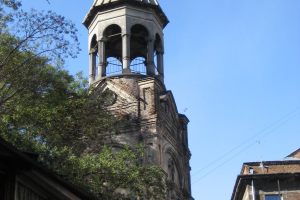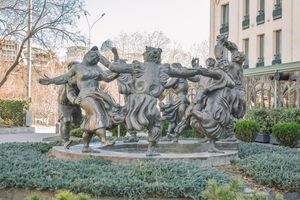About
At the geographic center of Georgia’s capital city Tbilisi, visible from every point in the city, stands the Iveria Hotel. In the 1960s, the large hotel was built as the prime hotel of the capital of the then Georgian Soviet Republic. Tbilisi was a favorite local tourist destination for the USSR’s elites, most notably because of the reputation of the city’s acclaimed thermal baths.
When Georgia became independent, and relations with Russia became strained, Tbilisi’s tourism came to a sudden halt. But it wasn’t long until the Iveria hotel found a new, rather surprising purpose as a refugee camp.
After the dissolution of the Soviet Union, Georgia stumbled into a number of violent conflicts, most notably the Abkhazia War – a brutally-fought conflict within the breakaway region of Abkhazia in the Northwest of the country. The war in Abkhazia led to the expulsion of ethnic Georgians, who searched for refuge in Tbilisi.
Around 800 of the 200,000 IDPs in Georgia found a new home in the Iveria, which was effectively turned into a vertical refugee camp. It was highly unusual in that, unlike most refugee camps, this one was not located at a peripheral region but at the very heart of the capital city. Thus, the hotel became both a constant reminder and an epitomization of the country’s ongoing political problems.
Even after the hottest stages of the Abkhazia War, the government of Georgia was extremely reluctant to relocate the refugees, since officials were afraid that a relocation could create new realities on the ground and lead to a permanent settlement of the refugees in the capital region. It wasn’t until the Rose Revolution in 2003 and the resignation of president Shevardnadze that the situation of the refugees of the Iveria Hotel changed. In 2004, they were relocated to the suburbs of Tbilisi, and the hotel was completely refurbished.
In 2008, the hotel reopened as a luxury hotel under its new moniker Radisson Blu Iveria. For years, the colorful mosaic-like facade of the vertical refugee camp of the Iveria was one of the city’s most photographed objects. Today however, the modern glass facade of the hotel gives nothing away of its fascinating past.
The Abkhazia Conflict is still unsolved, and the partial recognization of Abkhazia’s independence by Russia made the conflict even less likely to be solved anytime soon. The war’s refugees, who have been caught up in the middle of the warring sides, still live in temporary housing and long for their return to their homeland.
Related Tags
Published
July 1, 2012































